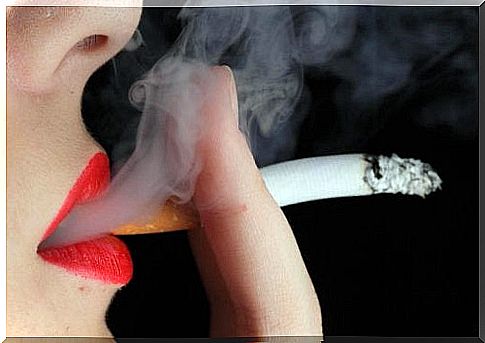How Do We Try To Hide Our Emotions?

When we experience emotions that we consider “negative”, very often we assume behaviors or attitudes that aim to conceal that emotional state. It is a strategy that people use often and that can work very well in the short term, because it gives relief and frees us from the more annoying physiological symptoms that accompany emotions.
The problem, however, arises in the long term, when that solution turns out to be just a patch applied hastily, in the throes of the need to silence that emotion. It is precisely these behaviors that are responsible for the fact that the problem continues to exist, hidden within us, and that the fragile wall we have built collapses when we least expect it.
Actions that were meant to “neutralize” emotions actually act as a negative reinforcement ; and it is perhaps precisely for this reason that we continue to use them and to harm ourselves, because we know that, in reality, they do not help us.
Examples of these behaviors include compulsive eating after an anxiety crisis, desperately calling our partner when we are in a fit of jealousy, taking drugs or gambling large amounts of money.
Tolerance to emotions
In psychology we usually try to explain to the patient that behaviors of this type, in addition to generating negative thoughts, actually allow the problem to survive and strengthen, both on the surface and in depth. Until he stops reacting in this way, then, the emotional damage is unlikely to heal, and the pain and suffering will never subside.
People often reject this theory because they struggle to tolerate emotions, to let them be, to fully experience them. The symptoms of certain emotions can be so unpleasant that we do everything possible to avoid them, even though we are aware that, in the long run, we will find ourselves in an even worse situation.
Human beings, in fact, are short-term hedonists: this means that they try to evade pain and obtain immediate pleasure or gratification, whatever the cost, without thinking about the consequences.

For example, there are people who, when they have to deal with a problematic situation, become very anxious, because they interpret it in an exaggerated way and believe that it is terrible and unbearable. To cover this anxiety, then, they eat until they burst.
It is clear that bingeing will not solve their problem or that situation. Indeed, if the person gets used to always reacting like this, soon he will have another problem.
Tolerating a feeling of intense anxiety at that moment seems more complicated than the alternative, finding an immediate solution, without thinking too much about it . In fact, those who binge against anxiety usually start opening the refrigerator or cupboards in search of something to put in their mouth even before realizing what they are doing.
The ideal would have been to opt for an alternative activity against anxiety, for example to breathe deeply, analyze the problem well, look for solutions or alternatives, think rationally and carry out your project, trying to accept the fact. that we can feel anxious.
Anxiety is an emotion that, on a physiological level, acts like a curve : it increases until it reaches a peak from which it begins to descend, provided we do not block it with one of those “patches” we are talking about.
Some ways to hide emotions
Everyone has sometimes concealed an emotion to suffer less, if only to get some momentary relief. If it does not turn into a habit, it is not a problematic reaction but, as we have already said, many times it can lead to an even more serious problem: a psychological problem.
Some options we use to hide our emotions can be:
The food
Food has a strong power over people, because, in addition to eliminating the feeling of hunger, it produces pleasure.
On the other hand, a binge, especially of sweet and fatty food, can make us believe that we have managed to reduce or even eliminate the feeling of anxiety. This can lead to the habit of appeasing our emotions with food, a behavior which, of course, can lead to serious eating disorders.

The drugs
Just like food, drugs also act on the pleasure and reward centers, releasing dopamine in our brains, a substance that makes us feel good in no time.
Tobacco, hashish, alcohol, or other drugs work as a powerful emotional buffer. People who have low frustration tolerance are very likely to fall into a drug addiction problem for this very reason.
The pathological game
As with previous activities, pathological gambling also gives us a feeling of reward, because, even when we lose more money than we can earn, the expectation of winning keeps us alert and motivated, distracts us from worries and leads us to escape for that moment. If we lose, however, the problem can get even bigger.
Inactivity
It is a typical reaction in depressive states. To avoid suffering and free themselves from stress, people “stop living”, remain inactive at home, cancel all plans and commitments they had and, in the worst case, even have to ask for a leave from work. This attitude often gets a second “benefit”, that of support and attention from friends and family, which increases its power over the person.

Lack of assertiveness
Having a very aggressive behavior or, on the contrary, being submissive and giving in to everything, are two behaviors that prevent us from suffering for others. Aggression allows us to get others to do what we want right away; while passivity frees us from the feeling of guilt that could arise from the defense of our rights.
Seeking reassurance
Even secretly checking your partner’s cell phone, making sure we have turned off the gas a thousand times or having dozens of medical checks are behaviors that aim to free us from anxiety about the fact that something bad can happen to us, even when it is not. very realistic.
Other behaviors of this type may be the fact of always carrying medicines with you when it is not necessary or being too tied to an amulet or superstitious rituals.









